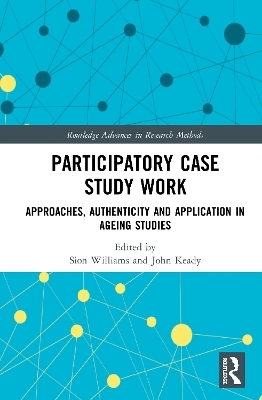
Participatory Case Study Work
Routledge (Verlag)
978-0-367-61512-3 (ISBN)
Whilst case study research has a relatively long tradition in the canon of research methodologies, little attention has so far been paid to the importance and value of participatory case study work. This is surprising as its egalitarian and democratic value-base naturally lends itself to the co-production and co-creation of personal and collective theory drawn directly from lived experience.
The book brings together over 15 years’ worth of participatory case study work in ageing studies in which the editors have been actively involved as either front-line researchers or as supervisors to PhD and MPhil studies adopting the methodology, and from where each of the contributors is selected. Real-life case examples are shared in the main chapters of the book and they provide direction as to how learning can be applied to other settings. The chapters also contain key references and recommended reading. This volume will appeal to undergraduate and postgraduate students as well as postdoctoral researchers interested in fields such as research methods, qualitative methods, ageing studies and mental health studies.
Sion Williams is Reader in Health Research in the School of Health Sciences at Bangor University, UK. John Keady is Professor of Older People’s Mental Health Nursing, a joint appointment between The University of Manchester and Greater Manchester Mental Health NHS Foundation Trust, UK.
Introduction
1. Participatory Case Study Work: What It Is, How It Functions and Our Adaptations to the Approach
Part 1: Working One-to-one to Develop a Personal Theory
2. Living at Home with Semantic Dementia: Creating a Life Story Book with Ruby and Brian to Support Personal Identity and Well-being
3. ‘The Man on the Cross’: Uncovering the Body, Faith and Reflexive Self in Late-stage Chronic Obstructive Pulmonary Disease
4. Living at Home with Young Onset Dementia: Co-constructing a Family Biography with Susan and Her Nominated Family Members
5. Diagramming Stroke Survivorship and Recovery: Supporting Malcolm and Margaret to Conceptually Develop and Find Meaning in the ‘Stroke Circle’ and Its Situated Function as a ‘Boundary Fence’
6. A Life in Balance: Co-constructing Sarah’s Early Adjustment to Alzheimer’s Disease Through a Series of Visual Representations of a See-saw
7. Visual Stories and Living with Dementia: Developing and Co-constructing a Neighbourhood Map with Diane and Dave to Represent Ageing-in-place
Part 2: Generating a Collective Theory from a Series of Personal Theories
8. Generating a Collective Theory of Early Diagnosis in Parkinson’s: The Value of the Participatory in Participatory Case Study Work
Part 3: Doing Participatory Case Study Work with Groups
9. Music in Mind: Understanding the ‘In The Moment’ Musical Experiences of People Living with Dementia in a Group Setting
10. ‘Stories from a Very Different Salford’: Co-designing and Co-producing a Biographical Place-making Animation with the Open Doors Research Group
11. New Horizons: Working with Communities to Develop Dementia Friendly Churches
Part 4: Drawing It Together
12. Conclusion: Reflections and Directions in Participatory Case Study Work
| Erscheinungsdatum | 13.07.2022 |
|---|---|
| Reihe/Serie | Routledge Advances in Research Methods |
| Zusatzinfo | 8 Tables, black and white; 19 Line drawings, black and white; 33 Halftones, black and white; 52 Illustrations, black and white |
| Verlagsort | London |
| Sprache | englisch |
| Maße | 156 x 234 mm |
| Gewicht | 385 g |
| Themenwelt | Sachbuch/Ratgeber ► Gesundheit / Leben / Psychologie ► Lebenshilfe / Lebensführung |
| Studium ► Querschnittsbereiche ► Prävention / Gesundheitsförderung | |
| Sozialwissenschaften ► Pädagogik ► Sozialpädagogik | |
| Sozialwissenschaften ► Soziologie | |
| ISBN-10 | 0-367-61512-6 / 0367615126 |
| ISBN-13 | 978-0-367-61512-3 / 9780367615123 |
| Zustand | Neuware |
| Informationen gemäß Produktsicherheitsverordnung (GPSR) | |
| Haben Sie eine Frage zum Produkt? |
aus dem Bereich


